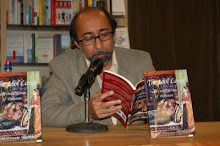On a certain level I am still trying to understand the film, its wider implications: its use of long shots (
reviews suggest 60 shots for entire film), a mix/switch of languages in the same conversatio

n as if Keitel's character understands different Balkan languages, contours of Balkan history, metaphor of undeveloped film roles, use of cold colors (
the most interesting aspect) pitched against human tragedy, use of water, rain, snow and fog, the use of an American character/well-known actor and so on. I'll write as I get more time. Be patient.
A question pops up in mind: Why does the backward journey start with Greece? Is it because Greece (victim of European snobbery) always has to prop up its claim to "the cradle of western civilization"? Cineaste, the film periodical, carried several excellent articles in various issues. Dina Iordanova, in Summer2007, Vol. 32, Issue 3, points out: " . . .
all important films from the region ultimately deal with historical memory." More importantly, the new Balkan cinema is also deconstructing the grand narrative of national purity that gripped these states as they acquired their new political indentities. Should the viewer question the choice of a male voyeur in Ulysses' Gaze? a nagging question lingers.
I accidently discovered that Ulysses' Gaze is connected to Angelopoulos' previous film, Weeping Meadows, in that the character Harvey Keitel plays as someone who has returned even if as a tourist, and it is this return that links the story to Alexis' character who in Weeping Meadows departs for America leaving Eleni behind "to bear the brunt of Greek war, political repression and civil war." But Ulysses' Gaze was made in 1995 and Weeping Meadows in 2004.
 ng his L'eclisse, paid a visit to th
ng his L'eclisse, paid a visit to th e painter. Rothko brought out his art one piece at a time and was full of anxiety due to Antonioni's silence for an hour or two, when the latter finally spoke through an interpreter saying that they both had the same subject matter: nothingness. Another version has it that the filmmaker said, "Your paintings are like my films. They are about nothing . . . with precision." Antonioni's Il Deserto Rosso was made after his meeting with Rothko and is considered a departure from Anotonioni's singature style of filmmaking. Then later today I happen to read a William Logan's review of Selected Poems by Frank O'Hara in New York Times Book Review and couldn't help admiring a photograph of Artists at the Cedar Tavern, 1959, with the following caption, "We often wrote poems while listening to the painters argue," Frank O'Hara recalled.
e painter. Rothko brought out his art one piece at a time and was full of anxiety due to Antonioni's silence for an hour or two, when the latter finally spoke through an interpreter saying that they both had the same subject matter: nothingness. Another version has it that the filmmaker said, "Your paintings are like my films. They are about nothing . . . with precision." Antonioni's Il Deserto Rosso was made after his meeting with Rothko and is considered a departure from Anotonioni's singature style of filmmaking. Then later today I happen to read a William Logan's review of Selected Poems by Frank O'Hara in New York Times Book Review and couldn't help admiring a photograph of Artists at the Cedar Tavern, 1959, with the following caption, "We often wrote poems while listening to the painters argue," Frank O'Hara recalled.



